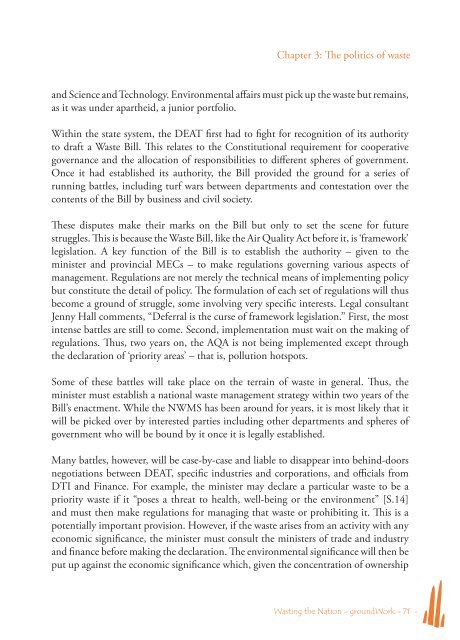Wasting the Nation.indd - Groundwork
Wasting the Nation.indd - Groundwork
Wasting the Nation.indd - Groundwork
Create successful ePaper yourself
Turn your PDF publications into a flip-book with our unique Google optimized e-Paper software.
Chapter 3: The politics of wasteand Science and Technology. Environmental affairs must pick up <strong>the</strong> waste but remains,as it was under apar<strong>the</strong>id, a junior portfolio.Within <strong>the</strong> state system, <strong>the</strong> DEAT first had to fight for recognition of its authorityto draft a Waste Bill. This relates to <strong>the</strong> Constitutional requirement for cooperativegovernance and <strong>the</strong> allocation of responsibilities to different spheres of government.Once it had established its authority, <strong>the</strong> Bill provided <strong>the</strong> ground for a series ofrunning battles, including turf wars between departments and contestation over <strong>the</strong>contents of <strong>the</strong> Bill by business and civil society.These disputes make <strong>the</strong>ir marks on <strong>the</strong> Bill but only to set <strong>the</strong> scene for futurestruggles. This is because <strong>the</strong> Waste Bill, like <strong>the</strong> Air Quality Act before it, is ‘framework’legislation. A key function of <strong>the</strong> Bill is to establish <strong>the</strong> authority – given to <strong>the</strong>minister and provincial MECs – to make regulations governing various aspects ofmanagement. Regulations are not merely <strong>the</strong> technical means of implementing policybut constitute <strong>the</strong> detail of policy. The formulation of each set of regulations will thusbecome a ground of struggle, some involving very specific interests. Legal consultantJenny Hall comments, “Deferral is <strong>the</strong> curse of framework legislation.” First, <strong>the</strong> mostintense battles are still to come. Second, implementation must wait on <strong>the</strong> making ofregulations. Thus, two years on, <strong>the</strong> AQA is not being implemented except through<strong>the</strong> declaration of ‘priority areas’ – that is, pollution hotspots.Some of <strong>the</strong>se battles will take place on <strong>the</strong> terrain of waste in general. Thus, <strong>the</strong>minister must establish a national waste management strategy within two years of <strong>the</strong>Bill’s enactment. While <strong>the</strong> NWMS has been around for years, it is most likely that itwill be picked over by interested parties including o<strong>the</strong>r departments and spheres ofgovernment who will be bound by it once it is legally established.Many battles, however, will be case-by-case and liable to disappear into behind-doorsnegotiations between DEAT, specific industries and corporations, and officials fromDTI and Finance. For example, <strong>the</strong> minister may declare a particular waste to be apriority waste if it “poses a threat to health, well-being or <strong>the</strong> environment” [S.14]and must <strong>the</strong>n make regulations for managing that waste or prohibiting it. This is apotentially important provision. However, if <strong>the</strong> waste arises from an activity with anyeconomic significance, <strong>the</strong> minister must consult <strong>the</strong> ministers of trade and industryand finance before making <strong>the</strong> declaration. The environmental significance will <strong>the</strong>n beput up against <strong>the</strong> economic significance which, given <strong>the</strong> concentration of ownership<strong>Wasting</strong> <strong>the</strong> <strong>Nation</strong> - groundWork - 71 -
















